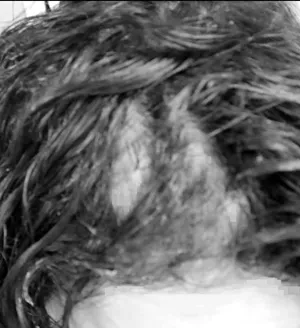Does A Progestin-Only IUD Trigger Androgenic Alopecia?
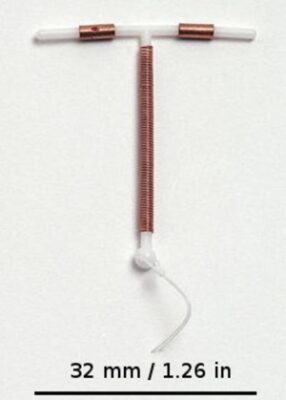 A common copper IUD (Paragard) with scale markings.
A common copper IUD (Paragard) with scale markings.Depending upon your current geographical location, an unwanted or unplanned pregnancy could be catastrophic. Especially in 2022 with the latest Supreme Court rulings.
As reproductive-age women worry about their conception options in current times, many are turning to more guaranteed prevention.
Reproductive Aged Women Have Become More Aware Of Their Need For Higher Levels Of Birth Control Prevention
One device young women are turning to is the intrauterine device, known as an Intrauterine device or IUD. It has become a popular form of birth control which is placed in the uterus by a medical professional.
The Centers for Disease Control and Prevention (CDC) reported that "more than 10 percent of women in the U.S. ages 15 to 49 used an IUD or a birth control implant from 2017 to 2019."
This is compared to just over 5 percent from 2006 to 2008.
All indications exist that with the latest abortion law changes, the number of IUD users is continuing to grow.
Why The IUD?
It's a birth control option that, depending upon the device selected, may prevent pregnancy for many years while also providing relief for some menstrual-related issues.
Note: IUD maker Mirena is effective at preventing pregnancy for up to seven years. Kyleena is approved for five years, and Skyla is approved for three years.
Unfortunately, many young women embracing the trendy IUDs are not aware of the major hidden danger of temporary or long-term hormonal-related hair loss.
This is a serious concern that needs to be shared with all who may be at risk.
Advantages Outweigh Potential Side Effects, Which May Trigger Androgenic Alopecia (AGA) For Some
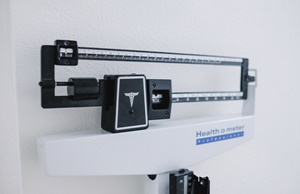 Doctors Office Scale - Unsplash.com
Doctors Office Scale - Unsplash.comThe advantages include a high level of effectiveness with long-lasting pregnancy prevention.
It can also regulate or completely eliminate menstrual cycles.
The IUD can also lessen difficult period symptoms (painful cramps, heavy bleeding) and in some cases, help with pre-menstrual conditions.
Disadvantages for some women with the progestin-only IUD may be weight gain or hair loss, or both.
Statistics indicate that less than 5 percent of patients who have an IUD placed actually have any type of weight gain, which may be minimal.
IUD Manufacturers Suggest IUD-Related Hair Loss Is Minimal As A Side Effect
IUD manufacturer Mirena states on their product label that IUD hair loss happens in less than 5% of women.
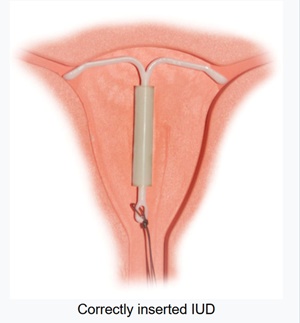 Mirena IntraUterine System (IUD)
Mirena IntraUterine System (IUD)Kyleena's clinical trials indicate that approximately 1% of patients experienced hair loss. There is no hair loss data at this time for IUD manufacturers Liletta and Skyla.
Some doctors, as well as the manufacturers, suggest that if hair loss does occur after the insertion of an IUD, it is purely coincidental.
Female hair loss may occur for many different reasons, which doctors and IUD manufacturers suggest may be independent of the use of an IUD.
That may be true, but for some, it is definitely hormonal-related birth control triggers.
See: How Common Is Women's IUD Related Hair Loss
Hair Loss Side Effects Of Progestin-only IUDs
According to The American Hair loss Association, founded by Spencer Kobren, "women who are predisposed to androgenic alopecia (AGA) have a higher risk of triggering long-term hair loss with the use of hormonal birth control."
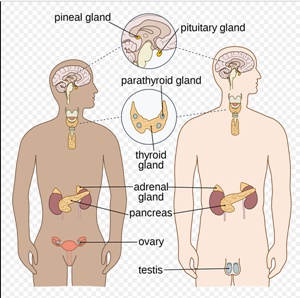 A human endocrine system with labels; modified and extended version of https://commons.wikimedia.org/wiki/File:1801_The_Endocrine_System.jpg by OpenStax.
A human endocrine system with labels; modified and extended version of https://commons.wikimedia.org/wiki/File:1801_The_Endocrine_System.jpg by OpenStax.Women of any age who are genetically predisposed to female pattern hair loss (FPHL) may be hypersensitive to the hormonal changes taking place in their bodies on any type of hormonal form of birth control, like the Progestin IUD.
The human endocrine system is a messenger system comprising feedback loops of the hormones released by the internal glands of an organism directly into the circulatory system, regulating distant target organs.
A progestin-only IUD could be another type of hormonal form of birth control that may trigger AGA in a woman with a family history of pattern baldness.
Many doctors and researchers agree that low estrogen levels can cause hair loss, possibly due to the progestin hormone contained in some of the popular IUDs being recommended to young women.
If Androgentic Alopecia Is Switched On, You May Not Be Able To Ever Switch It Off
The danger of triggering genetically predisposed androgentic alopecia (AGA) is not as commonly discussed by physicians as it should be.
It's a real danger that must be evaluated and considered.
Many young women who were not aware that they had a genetic predisposition to a family history of female pattern hair loss may naively assume that they are exempt from hair loss triggers.
 This picture shows Erich Ludwig's female pattern baldness classification system.
This picture shows Erich Ludwig's female pattern baldness classification system.The hormonal IUD does has known potential to switch on hair loss genes. Once triggered, these genes most likely will be progressive for the rest of the patient's lifetime.
It's absolutely critical to skip any birth control options without first giving them great consideration and doing your research.
Hair Loss Related Shedding May Not Occur While IUD Is Inserted But Could Start Weeks To Month After It Is Removed
Hormonal changes related to the insertion of an IUD may trigger the early onset of genetic hair loss. These hormonal changes are very similar to those which can occur while on the pill.
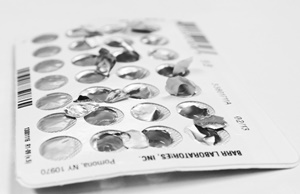 Birth Control Pills - Wikipedia
Birth Control Pills - WikipediaEven if hair loss doesn't occur while the IUD is actively in place in the uterus, the hair loss may start after the IUD is discontinued.
Again, this is similar to the experiences women have had while taking birth control devices, such as pills or other implantable devices.
Some women who have their IUDs removed report that several weeks or months afterward, they experience major shedding, which doesn't seem to slow down.
Once that AGA hair loss gene trigger is switched on, it is might not be able to be switched off. Ever.
The American Hair loss Association points out, "if you ever wondered why women’s hair loss seems more prevalent today than in any other time in history, take a close look at the side effects of these hormonal medications, and you might find the answer."
Copper IUD May Not Trigger Androgenic Alopecia Or Other Hair Loss Conditions
Hormonal IUDs are more likely to cause hair loss than copper IUDs.
Paragard is the only copper IUD that’s safe for use in the United States and approved by the FDA.
Doctors and researchers believe that low estrogen levels can cause hair loss, possibly due to the progestin hormone in some IUDs.
The copper IUD has no hormones, so it doesn't have these issues, but it does have its own set of potential side effects, including:
- Heavier or longer periods
- More or worse, cramps
- Irregular periodsThere are other challenges with an IUD, including initial insertion, which may be uncomfortable. Always discuss your options with your physician.
Do Your Own Research Before You Agree To A Hormonal IUD Or Similar Birth Control Options
According to the CDC, approximately 14% of women between the ages of 15 and 49 who are using some sort of birth control in the United States have an IUD.
Before you consider any type of hormonal-related birth control, do rigorous research on your family history. Does anyone on either side of your family tree have male or female pattern baldness?
Even aunts, uncles, and older siblings can give you an indication of your risk factors.
Androgenic alopecia (AGA), or pattern baldness, is a genetic predisposition for both men and women of all ages.
If you have a genetic predisposition and you use any type of hormone-related birth control, you might turn on the hair loss gene.
Remember, once you turn it on, you might not be able to turn it off.
Summary - Does A Progestin-Only IUD Trigger Androgenic Alopecia?
 Medical Doctor - HB Media - All Rights Reserved
Medical Doctor - HB Media - All Rights ReservedNo two women who decide to use an IUD for their method of birth control are the same. Their reaction to the IUD they select, whether hormonal or copper, will also be unique.
While hair loss may occur for a wide range of reasons, there are some indications that hormonal IUDs and related birth control devices may be a culprit in some cases.
Hair loss may occur while you have a hormonal IUD in place, or it may not occur until after you have it removed. Talk to your physician about your concerns, but make your own decision on the safety of hormone birth control.
Once you turn on a hair pattern baldness gene, you may never be able to turn it off. Choose wisely.
Remember, there are other forms of birth control that do not put your hair at risk for the rest of your life.
Take your time and take care of the long-term life of your hair.
More About Spencer Kobren
 Spencer David Kobren - Renowned Hair Loss Consumer Advocate
Spencer David Kobren - Renowned Hair Loss Consumer AdvocateSpencer David Kobren is the Founder and President of the American Hair Loss Association, the nation’s foremost, privately held consumer organization dedicated to educating the public, healthcare professionals, and the mainstream media about the emotionally devastating and life-altering disease of hair loss.
Mr. Kobren is considered the country’s most prominent and effective consumer/patient advocate. He’s the author of the groundbreaking International Best Seller, The Bald Truth; The First Complete Guide to Preventing and Treating Hair Loss (Pocket Books/Simon & Schuster), which has become the most widely read consumer hair loss guide of all time. Published in five languages and sold in every English-speaking country in the world, The Bald Truth has touched the lives of countless hair loss sufferers in search of real hope. His second book, The Truth About Women’s Hair Loss; What Really Works for Treating and Preventing Thinning Hair (Contemporary Books/McGraw-Hill) has forever changed the way medicine and society look at this neglected epidemic.
Referred to as the “Father” of consumer hair loss education, Mr. Kobren is a contributing editor for Consumer’s Digest Magazine and WebMD and is the Founder and Director of Consumer/Patient affairs of The International Alliance of Hair Restoration Surgeons. Mr. Kobren also holds a position on the scientific advisory board of biotech startup HairDx, provider of the first genetic test to determine the likelihood of developing male or female pattern hair loss.
Kobren’s uniquely powerful approach to the promotion of smart consumerism and patient education has earned him critical acclaim from media outlets around the globe and was a focus of the Discovery Channel documentary “The Bald Truth”.
Kobren and his work have been featured in articles in many publications, including GQ, The Wall Street Journal, The Washington Post Magazine, Men’s Health, Men’s Journal, Newsday, The New York Times, The Los Angeles Times, The Atlanta Journal-Constitution, The Pittsburgh Tribune-Review and The Washington Post. Kobren has been interviewed by local and national affiliates of ABC News, NBC News, The Fox News Organization, CBS News, and the CBC. He has also been interviewed for ABC News “20/20” and “Good Morning America.” Mr. Kobren has had a chapter dedicated to his work in New York Post columnist Gersh Kuntzman’s Book Hair! Mankind’s Historic Quest to End Baldness.
” Until the day comes when we can retire alopecia, due to the success of modern genetic medicine, Spencer David Kobren is our voice of truth in the madness of hair loss and the hair loss industry.”
-Angela M. Christiano, Ph.D. Associate Professor of Dermatology and Genetics
and Development, Columbia University


 A common copper IUD (Paragard) with scale markings.
A common copper IUD (Paragard) with scale markings. Doctors Office Scale - Unsplash.com
Doctors Office Scale - Unsplash.com Mirena IntraUterine System (IUD)
Mirena IntraUterine System (IUD) A human endocrine system with labels; modified and extended version of https://commons.wikimedia.org/wiki/File:1801_The_Endocrine_System.jpg by OpenStax.
A human endocrine system with labels; modified and extended version of https://commons.wikimedia.org/wiki/File:1801_The_Endocrine_System.jpg by OpenStax. This picture shows Erich Ludwig's female pattern baldness classification system.
This picture shows Erich Ludwig's female pattern baldness classification system. Birth Control Pills - Wikipedia
Birth Control Pills - Wikipedia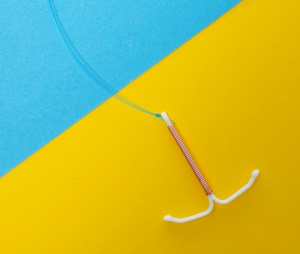

 Medical Doctor - HB Media - All Rights Reserved
Medical Doctor - HB Media - All Rights Reserved Spencer David Kobren - Renowned Hair Loss Consumer Advocate
Spencer David Kobren - Renowned Hair Loss Consumer Advocate


